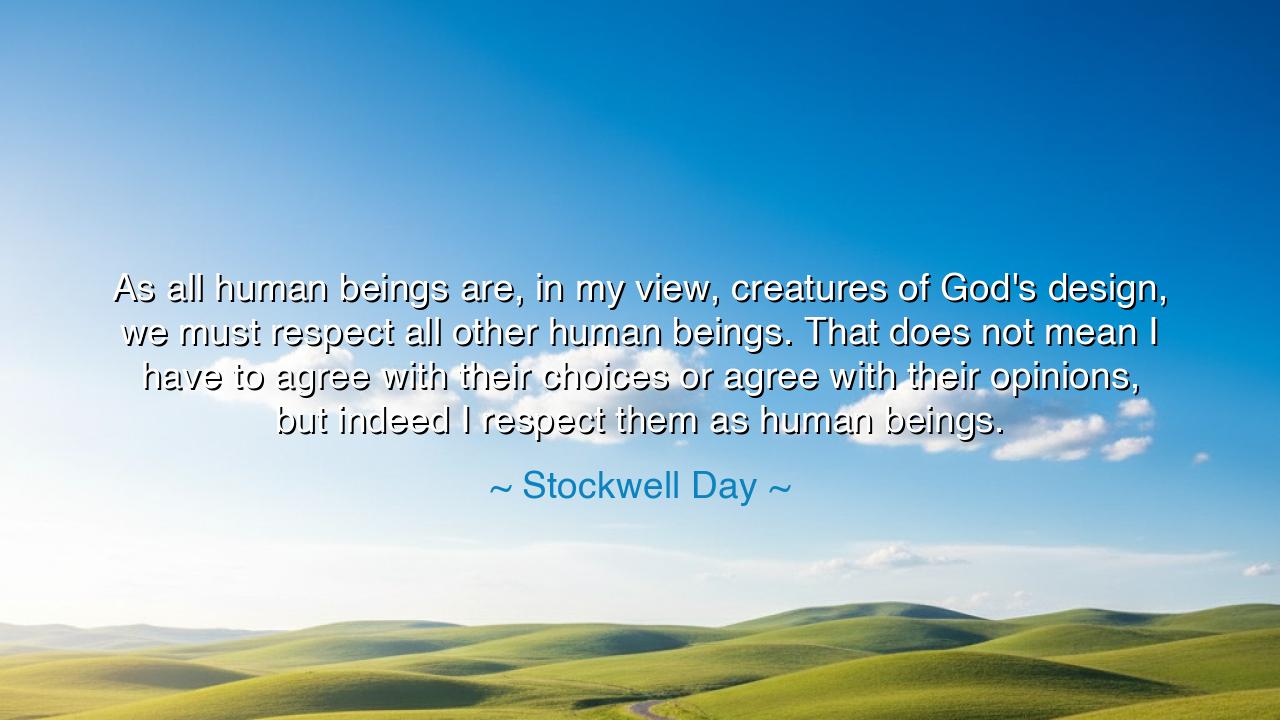
As all human beings are, in my view, creatures of God's design
As all human beings are, in my view, creatures of God's design, we must respect all other human beings. That does not mean I have to agree with their choices or agree with their opinions, but indeed I respect them as human beings.






Hearken, children of the ages, and open your hearts to the wisdom of Stockwell Day: “As all human beings are, in my view, creatures of God's design, we must respect all other human beings. That does not mean I have to agree with their choices or agree with their opinions, but indeed I respect them as human beings.” Understand this: the dignity of life does not depend upon agreement, conformity, or approval. It rests upon recognition of a sacred spark, the divine design inherent in every person, and the moral obligation to honor it with respect.
From the earliest civilizations, sages and philosophers recognized this truth. Confucius taught that harmony in society arises from proper conduct, respect, and recognition of the inherent worth of every individual. Likewise, the Stoics, such as Epictetus and Marcus Aurelius, emphasized that all humans share a common rational nature, deserving of moral regard even when their actions differ from our own. Day’s reflection mirrors this enduring wisdom: respect is not conditional on agreement, but grounded in recognition of shared humanity.
Even the ancients understood that conflict and disagreement are inevitable among human beings. Socrates, through his dialectic, engaged repeatedly with those who held opposing views, yet he treated them with dignity and attention, seeking understanding rather than domination. Day’s words echo this principle: one may disagree without dehumanizing, maintaining ethical integrity while engaging in discourse and debate.
Consider the story of Abraham Lincoln, who led a nation divided by war and deep moral conflict. He encountered countless individuals whose choices and beliefs he opposed, yet he often extended respect and sought dialogue, striving to preserve unity and honor humanity itself. Lincoln understood, as Day teaches, that disagreement does not absolve us from respecting the intrinsic worth of others.
Even in modern life, the principle holds true. In workplaces, communities, and nations, individuals hold diverse opinions, beliefs, and choices. Mutual respect allows for dialogue, cooperation, and understanding, even amid disagreement. To disregard respect for others is to erode the foundations of community, trust, and civilization. Day’s reflection reminds us that moral duty transcends alignment of thought: it is recognition of the divine or intrinsic worth within each person.
The lesson is timeless: respect is a cornerstone of ethical living. To honor the humanity of others, even when we disagree, fosters peace, dialogue, and understanding. It does not require compromise of one’s own principles, nor acceptance of harmful actions; rather, it requires acknowledgment that every human being possesses inherent dignity, deserving of regard and ethical treatment.
Practical action flows naturally. In your interactions, listen attentively, seek understanding, and acknowledge the value of others’ perspectives, even when opposed. Engage in debate with civility, treat differences with patience, and resist the impulse to diminish or dehumanize. In doing so, you cultivate moral strength and contribute to a society rooted in respect, integrity, and shared humanity.
Children of the ages, remember this: the measure of civilization is found not only in wisdom or achievement, but in the respect we show to one another. Let the words of Stockwell Day guide your hand and heart: honor the divine design in every human being, engage with dignity, and uphold the sacred principle that disagreement need not erase respect. In this path lies both justice and enduring moral virtue.






AAdministratorAdministrator
Welcome, honored guests. Please leave a comment, we will respond soon